
ENOXAPARIN ROVI 8,000 IU (80 mg)/0.8 mL PRE-FILLED SYRINGE SOLUTION FOR INJECTION
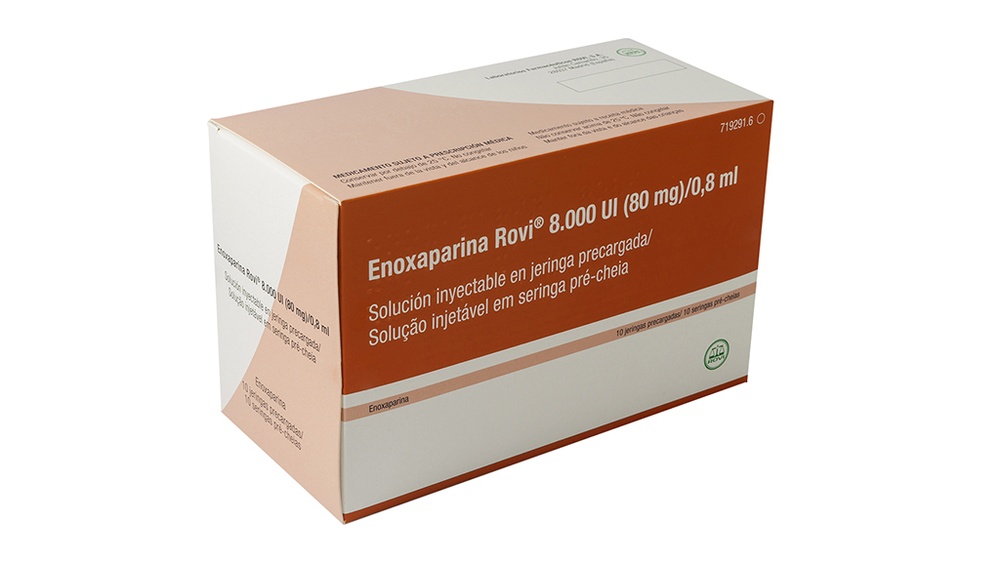

How to use ENOXAPARIN ROVI 8,000 IU (80 mg)/0.8 mL PRE-FILLED SYRINGE SOLUTION FOR INJECTION
Translated with AI
This page provides general information and does not replace a doctor’s consultation. Always consult a doctor before taking any medication. Seek urgent medical care if symptoms are severe.
Show originalContents of the leaflet
Introduction
Package Leaflet: Information for the User
Enoxaparina Rovi 8,000 IU (80 mg)/0.8 ml Solution for Injection in Pre-filled Syringe
enoxaparina sodium
Read all of this leaflet carefully before you start using this medicine because it contains important information for you.
- Keep this leaflet, you may need to read it again.
- If you have any further questions, ask your doctor, pharmacist, or nurse.
- This medicine has been prescribed for you only. Do not pass it on to others. It may harm them, even if their signs of illness are the same as yours.
- If you get any side effects, talk to your doctor or pharmacist. This includes any possible side effects not listed in this leaflet. See section 4.
Contents of the Pack
- What Enoxaparina Rovi is and what it is used for
- What you need to know before you use Enoxaparina Rovi
- How to use Enoxaparina Rovi
- Possible side effects
- Storage of Enoxaparina Rovi
- Contents of the Pack and Further Information
1. What Enoxaparina Rovi is and what it is used for
Enoxaparina Rovi contains the active substance enoxaparin sodium, which is a low molecular weight heparin (LMWH).
Enoxaparina Rovi works in two ways:
- Preventing existing blood clots from getting bigger. This helps your body to break them down and stop them from causing harm.
- Stopping new blood clots from forming.
Enoxaparina Rovi can be used to:
- Treat blood clots.
- Prevent blood clots from forming in the following situations:
- Before and after surgery.
- When you have an acute illness and have to spend a period of time in bed.
- If you have had a blood clot due to cancer, to prevent more clots from forming.
- When you have unstable angina (a condition where not enough blood reaches the heart).
- After a heart attack.
- Prevent blood clots from forming in the tubes of a dialysis machine (used in people with severe kidney problems).
2. What you need to know before you use Enoxaparina Rovi
Do not use Enoxaparina Rovi
- If you are allergic to enoxaparin sodium or any of the other ingredients of this medicine (listed in section 6). The signs of an allergic reaction include: rash, problems swallowing or breathing, swelling of the lips, face, throat, or tongue.
- If you are allergic to heparin or other low molecular weight heparins, such as nadroparin, tinzaparin, or dalteparin.
- If you have had a reaction to heparin that caused a severe decrease in the number of cells involved in blood clotting (platelets) - this reaction is called heparin-induced thrombocytopenia - in the last 100 days or if you have antibodies against enoxaparin in your blood.
- If you are bleeding heavily or have a high risk of bleeding (such as a stomach ulcer, recent eye or brain surgery), including a recent hemorrhagic stroke.
- If you are using Enoxaparina Rovi to treat blood clots and are going to have spinal or epidural anesthesia or a lumbar puncture within 24 hours.
Warnings and Precautions
Enoxaparina Rovi should not be exchanged with other low molecular weight heparin medicines. This is because they are not exactly the same and do not have the same activity or instructions for use.
Talk to your doctor or pharmacist before you start using Enoxaparina Rovi if:
- you have ever had a reaction to heparin that caused a severe decrease in the number of platelets
- you are going to have spinal or lumbar anesthesia or a lumbar puncture (see "Surgery and Anesthesia"): a delay must be observed between Enoxaparina Rovi and the use of this procedure
- you have had a heart valve implanted
- you have endocarditis (an infection of the inner lining of the heart)
- you have a history of stomach ulcers
- you have recently had a stroke
- you have high blood pressure
- you have diabetes or problems with the blood vessels in the eyes caused by diabetes (called diabetic retinopathy)
- you have recently had eye or brain surgery
- you are an elderly person (over 65 years old) and especially if you are over 75 years old
- you have kidney problems
- you have liver problems
- you are underweight or overweight
- you have high levels of potassium in your blood (which could be checked with a blood test)
- you are currently using medicines that affect bleeding (see below - Using Enoxaparina Rovi with other medicines).
You may need to have a blood test before you start using this medicine and while you are using it; this is to check the level of cells involved in blood clotting (platelets) and the levels of potassium in your blood.
Children and Adolescents
The safety and efficacy of enoxaparin in children and adolescents have not been established.
Using Enoxaparina Rovi with other medicines
Tell your doctor or pharmacist if you are using, have recently used, or might use any other medicines.
- Warfarin - used to reduce blood clotting
- Aspirin (also known as acetylsalicylic acid or AAS), clopidogrel, or other medicines used to prevent blood clots from forming (see also section 3, "Change of anticoagulant treatment")
- Dextran injection - used as a blood substitute
- Ibuprofen, diclofenac, ketorolac, and other medicines known as non-steroidal anti-inflammatory drugs used to treat pain and inflammation in arthritis and other diseases
- Prednisolone, dexamethasone, and other medicines used to treat asthma, rheumatoid arthritis, and other diseases
- Medicines that increase the level of potassium in your blood, such as potassium salts, diuretics, and some medicines used to treat heart problems.
Surgery and Anesthesia
If you are going to have a lumbar puncture or are going to undergo surgery where spinal or epidural anesthesia will be used, tell your doctor that you are using Enoxaparina Rovi. See "Using Enoxaparina Rovi with other medicines". Also, tell your doctor if you have any problems with your spine or if you have had spine surgery.
Pregnancy and Breastfeeding
If you are pregnant, think you may be pregnant, or are planning to become pregnant, consult your doctor or pharmacist before using this medicine.
If you are pregnant and have a mechanical heart valve, you may have a higher risk of blood clots. Your doctor will discuss this with you.
If you are breastfeeding or plan to breastfeed, you must consult your doctor before using this medicine.
Driving and Using Machines
Enoxaparina Rovi does not affect your ability to drive or use machines.
It is recommended that your healthcare professional records the trade name and batch number of the product you are using.
Enoxaparina Rovi contains sodium
This medicine contains less than 23 mg of sodium (1 mmol) per dose; this is essentially "sodium-free".
3. How to use Enoxaparina Rovi
Follow exactly the administration instructions of this medication as indicated by your doctor or pharmacist. In case of doubt, consult your doctor or pharmacist again.
Use of the medication
- Normally, your doctor or nurse will administer Enoxaparina Rovi to you. This is because it must be administered by injection.
- When you return home, you may need to continue using Enoxaparina Rovi and administer it yourself (see the instructions on how to do it).
- Enoxaparina Rovi is usually administered by injection under the skin (subcutaneously).
- Enoxaparina Rovi can be administered by injection into your veins (intravenously) after certain types of heart attacks and surgical operations.
- Enoxaparina Rovi can be added to the tube that comes out of the body (arterial line) at the beginning of the dialysis session.
Do not administer Enoxaparina Rovi into a muscle (intramuscularly).
How much will be administered to you
- Your doctor will decide the amount of Enoxaparina Rovi that will be administered to you. The amount will depend on the reason why it is going to be used.
- If you have any kidney problems, you may be administered a smaller amount of Enoxaparina Rovi.
- Treatment of blood clot formation:
- The usual dose is 150 IU (1.5 mg) per kilogram of body weight per day or 100 IU (1 mg) per kilogram of body weight twice a day.
- Your doctor will decide how long you will receive Enoxaparina Rovi.
- Prevention of blood clot formation in the following situations:
Surgery or periods of limited mobility due to illness
- The dose will depend on the probability that you will develop a clot. You will be administered 2,000 IU (20 mg) or 4,000 IU (40 mg) of Enoxaparina Rovi per day.
- If you are going to have surgery, you will usually be given the first injection 2 or 12 hours before the operation.
- If you have reduced mobility due to illness, you will usually be administered 4,000 IU (40 mg) of Enoxaparina Rovi per day.
- Your doctor will decide how long you will receive Enoxaparina Rovi.
After having a heart attack
Enoxaparina Rovi can be used in 2 different types of heart attacks, called STEMI (ST-elevation myocardial infarction) or non-STEMI. The amount of Enoxaparina Rovi that will be administered to you will depend on your age and the type of heart attack you had.
Non-STEMI heart attack:
- The usual dose is 100 IU (1 mg) per kilogram of body weight every 12 hours.
- Usually, your doctor will tell you to also take aspirin (acetylsalicylic acid).
- Your doctor will decide how long you will receive Enoxaparina Rovi.
STEMI heart attack if you are under 75 years old:
- You will be administered an initial intravenous injection of 3,000 IU (30 mg) of Enoxaparina Rovi.
- At the same time, you will be administered a subcutaneous injection of Enoxaparina Rovi. The usual dose is 100 IU (1 mg) per kilogram of body weight every 12 hours.
- Usually, your doctor will tell you to also take aspirin (acetylsalicylic acid).
- Your doctor will decide how long you will receive Enoxaparina Rovi.
STEMI heart attack if you are 75 years old or older:
- The usual dose is 75 IU (0.75 mg) per kilogram of body weight every 12 hours.
- The maximum amount of Enoxaparina Rovi administered in the first two injections is 7,500 IU (75 mg).
- Your doctor will decide how long you will receive Enoxaparina Rovi.
For patients undergoing percutaneous coronary intervention (PCI):
Depending on when you received the last injection of Enoxaparina Rovi, your doctor may decide to administer an additional dose of Enoxaparina Rovi before a PCI procedure. This would be by intravenous injection.
- Prevention of blood clot formation in the dialysis machine tubes:
- The usual dose is 100 IU (1 mg) per kilogram of body weight.
- Enoxaparina Rovi is added to the tube that comes out of the body (arterial line) at the beginning of the dialysis session. This amount is usually sufficient for a 4-hour session. However, your doctor may perform a new injection of 50 IU to 100 IU (0.5 to 1 mg) per kilogram of body weight if necessary.
Instructions for using the syringe
If you are going to inject Enoxaparina Rovi yourself
If you can administer Enoxaparina Rovi yourself, your doctor or nursing staff will show you how to do it. Do not attempt to inject yourself if you have not been taught how to do it. If you are unsure what to do, consult your doctor or nurse immediately. If the injection is performed correctly under the skin (subcutaneously), this will help reduce pain and bruising at the injection site.
Before injecting Enoxaparina Rovi yourself
? Prepare what you will need: syringe, cotton swab with alcohol or soap and water, and a container for sharp objects.
? Check the expiration date of the medication. If it has expired, do not use it.
? Check that the syringe is not damaged and that the medication solution is clear. If it is not, use another syringe.
? Make sure you know the amount to be injected.
? Review the area of your stomach to see if the last injection caused redness, skin color change, swelling, suppuration, or pain that still persists. If this occurs, consult your doctor or nurse.
Instructions for injecting Enoxaparina Rovi yourself:
(Instructions for syringes without a safety device)
Preparing the injection site
- Choose an area on the right or left side of your stomach. At least 5 cm from the navel and towards either side.
? Do not inject within 5 cm of your navel or around it if there are scars or bruises.
? To inject, alternate the left and right sides of your stomach, depending on where you injected the last time.

- Wash your hands. Clean (do not rub) the area where you will perform the injection with a cotton swab with alcohol or with soap and water.
- Sit or lie down in a comfortable position so that you are relaxed. Check that you can see the area where you will inject. The most suitable is on a couch, reclining chair, or in a bed with pillows.
Selecting the dose
- Carefully remove the needle cap from the syringe by pulling it. Discard the cap.
? Before injecting, do not press the plunger to eliminate air bubbles. This can cause a loss of medication.
? Once you have removed the cap, do not touch anything with the needle. This will ensure that the needle remains clean (sterile).
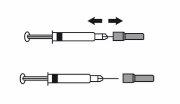
- When the amount of medication in the syringe matches the prescribed dose, there is no need to adjust the dose. You are now ready to administer the injection.
- When the dose depends on your body weight, you may need to adjust the dose in the syringe to match the prescribed dose. In this case, you can dispose of the excess medication by keeping the syringe pointing downwards (to keep the air bubble in the syringe) and expelling the excess into a container.
- A drop may appear at the tip of the needle. If this happens, you must eliminate the drop before administering the injection by gently tapping the syringe with the needle pointing downwards. You are now ready to administer the injection.
Administering the injection
- Hold the syringe with the hand that writes (as if it were a pencil). With the other hand, gently pinch the area you have cleaned on your stomach, between your index finger and thumb to form a fold in the skin.
? Make sure to hold this skin fold while the injection lasts.
- Maintain the syringe so that the needle points straight down (vertically with a 90-degree angle). Insert the entire needle into the skin fold.
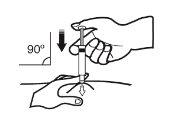
- Press the plunger with your thumb. This will administer the medication into the fatty tissue of your stomach. Complete the injection using all the medication in the syringe.
- Remove the needle from the injection site by pulling it straight out. Direct the needle away from yourself and others. You can now release the skin fold.
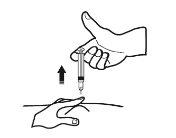
When you have finished
- To avoid bruising, do not rub the injection site after you have injected.
- Deposit the used syringe in the container for sharp objects. Close the container lid well and place the container out of the reach of children. When the container is full, dispose of it as your doctor or pharmacist has indicated.
The disposal of unused medication and all materials that have come into contact with it will be carried out in accordance with local regulations.
If you think the dose is too high (for example, if you have an unexpected bleeding) or too low (for example, if the dose does not seem to be working), consult your doctor or pharmacist.
Instructions for syringes with a safety device:
Preparing the injection site
- Choose an area on the right or left side of your stomach. At least 5 cm from the navel and towards either side.
? Do not inject within 5 cm of your navel or around it if there are scars or bruises.
? To inject, alternate the left and right sides of your stomach, depending on where you injected the last time.

- Wash your hands. Clean (do not rub) the area where you will perform the injection with a cotton swab with alcohol or with soap and water.
- Sit or lie down in a comfortable position so that you are relaxed. Check that you can see the area where you will inject. The most suitable is on a couch, reclining chair, or in a bed with pillows.
Selecting the dose
- Carefully remove the needle cap from the syringe by pulling it. Discard the cap.
? Before injecting, do not press the plunger to eliminate air bubbles. This can cause a loss of medication.
? Once you have removed the cap, do not touch anything with the needle. This will ensure that the needle remains clean (sterile).
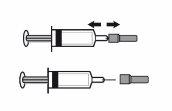
- When the amount of medication in the syringe matches the prescribed dose, there is no need to adjust the dose. You are now ready to administer the injection.
- When the dose depends on your body weight, you may need to adjust the dose in the syringe to match the prescribed dose. In this case, you can dispose of the excess medication by keeping the syringe pointing downwards (to keep the air bubble in the syringe) and expelling the excess into a container.
- A drop may appear at the tip of the needle. If this happens, you must eliminate the drop before administering the injection by gently tapping the syringe with the needle pointing downwards. You are now ready to administer the injection.
Administering the injection
- Hold the syringe with the hand that writes (as if it were a pencil). With the other hand, gently pinch the area you have cleaned on your stomach, between your index finger and thumb to form a fold in the skin.
? Make sure to hold this skin fold while the injection lasts.
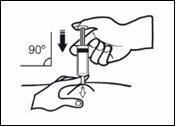 Maintain the syringe so that the needle points straight down (vertically with a 90-degree angle). Insert the entire needle into the skin fold.
Maintain the syringe so that the needle points straight down (vertically with a 90-degree angle). Insert the entire needle into the skin fold.
- Press the plunger with your thumb. This will administer the medication into the fatty tissue of your stomach. Complete the injection using all the medication in the syringe.
- Remove the needle from the injection site by pulling it straight out and keeping your finger on the plunger. The needle should be directed away from you and anyone else present. The safety system will be activated by firmly pressing the plunger. The protective sleeve will automatically cover the needle and emit an audible click that confirms the activation of the device. You can now release the skin fold.
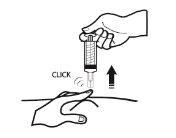
When you have finished
- To avoid bruising, do not rub the injection site after you have injected.
- Deposit the used syringe in the container for sharp objects. Close the container lid well and place the container out of the reach of children. When the container is full, dispose of it as your doctor or pharmacist has indicated.
The disposal of unused medication and all materials that have come into contact with it will be carried out in accordance with local regulations.
If you think the dose is too high (for example, if you have an unexpected bleeding) or too low (for example, if the dose does not seem to be working), consult your doctor or pharmacist.
Changing anticoagulant treatment
- Changing from Enoxaparina Rovi to anticoagulant medications called vitamin K antagonists (e.g., warfarin)
Your doctor will request a blood test to determine a parameter called INR and will tell you when to stop treatment with Enoxaparina Rovi.
- Changing from vitamin K antagonist medications (e.g., warfarin) to Enoxaparina Rovi
Stop using the vitamin K antagonist. Your doctor will request a blood test to determine a parameter called INR and will tell you when to start using Enoxaparina Rovi.
- Changing from Enoxaparina Rovi to treatment with direct oral anticoagulants
Stop using Enoxaparina Rovi. Start taking the direct oral anticoagulant 0-2 hours before the next scheduled injection, and then continue as usual.
- Changing from treatment with direct oral anticoagulants to Enoxaparina Rovi
Stop taking the direct oral anticoagulant. Do not start treatment with Enoxaparina Rovi until 12 hours have passed since the last dose of the direct oral anticoagulant.
If you use more Enoxaparina Rovi than you should
If you think you have used too much Enoxaparina Rovi or too little, inform your doctor, nurse, or pharmacist immediately, even if you do not have any signs of problems. If a child accidentally injects or swallows Enoxaparina Rovi, take them to the emergency room of a hospital immediately.
In case of overdose or accidental administration, consult your doctor or go to the emergency room of the nearest hospital, bringing this leaflet with you, or call the Toxicology Information Service, phone 91 562 04 20, indicating the medication and the amount administered.
If you forget to use Enoxaparina Rovi
If you forget to administer a dose, do so as soon as you remember. Do not use a double dose on the same day to make up for missed doses. To ensure that you do not miss any doses, it may be helpful to use a diary.
If you stop treatment with Enoxaparina Rovi
If you have any other questions about using this medication, ask your doctor or pharmacist or nurse.
It is important that you continue to receive Enoxaparina Rovi until your doctor decides to stop treatment. If you stop using it, a blood clot may form, which can be very dangerous.
4. Possible Adverse Effects
Like all medicines, this medicine may cause adverse effects, although not all people suffer from them.
Like other similar medicines (medicines to reduce blood clots), Enoxaparina Rovi could cause bleeding, which could potentially put your life at risk. In some cases, the bleeding may not be evident.
If you notice any episode of bleeding that does not stop by itself or if you notice signs of excessive bleeding (unusual weakness, fatigue, paleness, dizziness, headache, or unexplained swelling), consult your doctor immediately.
Your doctor may decide to keep you under strict observation or change your medication.
Interrupt treatment with enoxaparina and inform your doctor or nurse immediately if you experience any of the following symptoms:
- Any sign of severe allergic reaction (such as difficulty breathing, swelling of lips, mouth, throat, or eyes).
- A generalized, red, and scaly rash, with bumps under the skin and blisters, accompanied by fever. The symptoms usually appear at the beginning of treatment (acute generalized exanthematous pustulosis).
You should inform your doctor immediately
- If you present any sign of blockage of a blood vessel by a blood clot, such as:
- Cramp-like pain, redness, heat, or swelling in one of your legs, which are symptoms of deep vein thrombosis.
- Difficulty breathing, chest pain, fainting, or coughing up blood, which are symptoms of pulmonary embolism.
- If you have a painful skin rash with dark red spots under the skin that do not disappear when pressed.
Your doctor may request a blood test to check the number of platelets.
General List of Possible Adverse Effects:
Very common (may affect more than 1 in 10 people)
- Bleeding.
- Increased liver enzymes.
Common (may affect up to 1 in 10 people)
- If bruises appear more frequently than usual. This could be due to a blood problem due to a low number of platelets.
- Pink patches on the skin. They appear more frequently in the area where Enoxaparina Rovi has been injected.
- Skin rash (hives, urticaria).
- Redness and itching of the skin.
- Bruising or pain at the injection site.
- Decrease in the number of red blood cells in the blood.
- Increase in the number of platelets in the blood.
- Headache.
Uncommon (may affect up to 1 in 100 people)
- Sudden severe headache. This could be a sign of bleeding in the brain.
- Feeling of sensitivity to palpation and swelling of the stomach. It could be indicative of gastric bleeding.
- Large, red, and irregular skin lesions, with or without blisters.
- Skin irritation (local irritation).
- You may notice yellowing of the skin or eyes, and darkening of the urine color. This could be due to a liver problem.
Rare (may affect up to 1 in 1,000 people)
- Severe allergic reaction. The signs of this reaction may include: skin rash, swallowing or breathing problems, swelling of the lips, face, throat, or tongue.
- Increased potassium in the blood. This is more likely to occur in people with kidney problems or diabetes. Your doctor can check it by performing a blood test.
- Increased number of eosinophils in the blood. Your doctor can check it by performing a blood test.
- Hair loss.
- Osteoporosis (a disease in which bones can fracture more easily).
- Tingling, numbness, and weakness in the muscles (especially in the lower part of the body) when a lumbar puncture or spinal anesthesia has been performed.
- Loss of bladder or bowel control (so that you cannot control your needs).
- Hardening or nodule at the injection site.
Reporting of Adverse Effects
If you experience any type of adverse effect, consult your doctor, pharmacist, or nurse, even if it is a possible adverse effect that is not listed in this prospectus. You can also report them directly through the Spanish Pharmacovigilance System for Human Use Medicines: www.notificaRAM.es. By reporting adverse effects, you can contribute to providing more information on the safety of this medicine.
5. Conservation of Enoxaparina Rovi
Keep below 25 ºC. Do not freeze.
The pre-filled syringes of Enoxaparina Rovi contain a single dose; discard any unused product.
Keep this medicine out of the sight and reach of children.
Do not use this medicine after the expiration date that appears on the packaging after CAD. The expiration date is the last day of the month indicated.
Do not use this medicine if you observe that the syringe is damaged or that the product is not transparent.
Medicines should not be thrown away through the sewers or in the trash. Deposit the packaging and medicines you no longer need in the SIGRE Point of the pharmacy. Ask your pharmacist how to dispose of the packaging and medicines you no longer need. This way, you will help protect the environment.
6. Package Contents and Additional Information
Composition of Enoxaparina Rovi
- The active ingredient is sodium enoxaparin.
Each pre-filled syringe contains sodium enoxaparin with anti-Xa activity of 8,000 IU (equivalent to 80 mg) in 0.8 ml of water for injectable preparations.
- The other components are water for injectable preparations.
Appearance of the Product and Package Contents
Enoxaparina Rovi is a clear, colorless to light yellow, injectable solution in a pre-filled glass syringe of type I equipped with an injection needle, with or without an automatic safety device. It is presented as follows:
Enoxaparina Rovi 8,000 IU (80 mg)/0.8 ml injectable solution in a pre-filled graduated syringe of 1 ml.
Packaging of 2, 6, 10, 12, 20, 24, 30, and 50 syringes.
Only some package sizes may be marketed.
In some package sizes, the pre-filled syringe may be presented combined with a safety device.
Marketing Authorization Holder and Manufacturer
Marketing Authorization Holder
Laboratorios Farmacéuticos ROVI, S.A.
Julián Camarillo, 35
28037 - Madrid, Spain
Manufacturer
ROVI Pharma Industrial Services, S.A.
Julián Camarillo, 35
28037 - Madrid, Spain
This medicine is authorized in the Member States of the European Economic Area and in the United Kingdom (Northern Ireland) with the following names:
Austria, Denmark, Finland, Germany, Norway, Sweden: Enoxaparin Becat
Italy, Spain, Portugal: Enoxaparina Rovi
Belgium, France, Luxembourg, Netherlands: Enoxaparine Becat
Greece: Enoxaparin Rovi
Slovenia: Enoksaparin Rovi
Bulgaria, Czech Republic, Estonia, Croatia, Hungary, Latvia, Poland, Romania, Slovakia: Losmina
Ireland, United Kingdom (Northern Ireland): Arovi
Date of the Last Revision of this Prospectus:January 2025
Other Sources of Information
Detailed information about this medicine is available on the website of the Spanish Agency for Medicines and Health Products (AEMPS) (http://www.aemps.gob.es/)
- Country of registration
- Average pharmacy price57.35 EUR
- Active substance
- Prescription requiredYes
- Manufacturer
- This information is for reference only and does not constitute medical advice. Always consult a doctor before taking any medication. Oladoctor is not responsible for medical decisions based on this content.
- Alternatives to ENOXAPARIN ROVI 8,000 IU (80 mg)/0.8 mL PRE-FILLED SYRINGE SOLUTION FOR INJECTIONDosage form: INJECTABLE, 100 mg (10000 IU) enoxaparin sodium/mlActive substance: enoxaparinManufacturer: Sanofi Aventis S.A.Prescription requiredDosage form: INJECTABLE, 120 mg (12000 IU) /0.8 mlActive substance: enoxaparinManufacturer: Sanofi Aventis S.A.Prescription requiredDosage form: INJECTABLE, 150 mg (15000 IU) /1 mlActive substance: enoxaparinManufacturer: Sanofi Aventis S.A.Prescription required
Online doctors for ENOXAPARIN ROVI 8,000 IU (80 mg)/0.8 mL PRE-FILLED SYRINGE SOLUTION FOR INJECTION
Discuss questions about ENOXAPARIN ROVI 8,000 IU (80 mg)/0.8 mL PRE-FILLED SYRINGE SOLUTION FOR INJECTION, including use, safety considerations and prescription review, subject to medical assessment and local regulations.
Frequently Asked Questions















